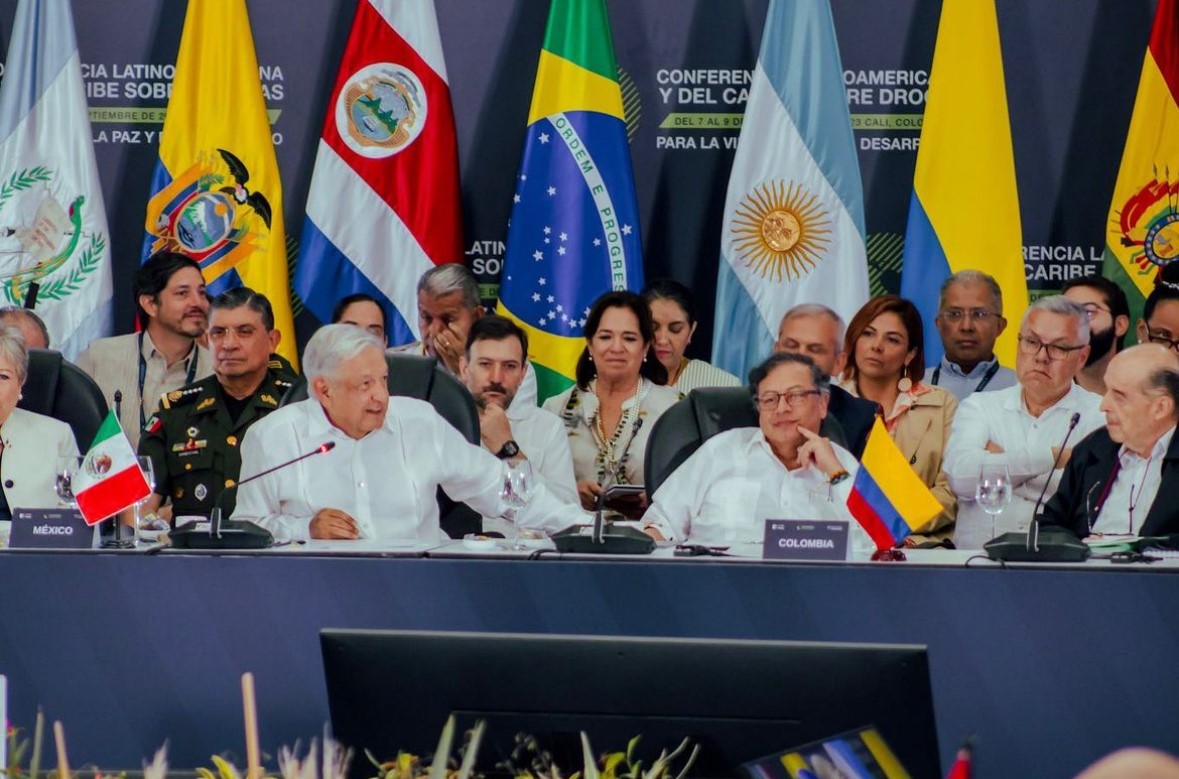From September 7 to 9, 2023, the “Latin American and Caribbean Drug Conference: For Life, Peace, and Development” took place in Cali, Colombia. This meeting aimed to establish a joint position on drug policy within the region, in a wider effort to transition away from the so-called “War on Drugs”.
While focused on drugs, the event touched upon related and essential topics, such as food security, migration, corruption, and climate change. 19 countries from the region participated in the conference, with several countries from across the world attending as observers.
Colombian President Gustavo Petro emphasised that the bloody and destructive experience of the war on drugs that Colombia endured has also been repeated in Mexico. For this reason, both countries assumed the responsibility of organising this meeting. As Petro emphasised, “We are the biggest victims of these policies, victims and not perpetrators, despite attempts to suggest otherwise.”
While civil society organisations, academics and activists have long denounced the devastating consequences and long-lasting issues of the drug war on numerous occasions, this conference represents a turning point, where regional leaders formally gathered to end this war and search for alternatives. This could have never been reached without all those who have endlessly advocated for the end of the “war on drugs” in Latin America and the Caribbean, and those who have imagined and created alternatives.
What were the Presidents of Colombia and Mexico’s speeches about?
Mexican President Andrés Manuel López Obrador emphasised the importance of developing employment alternatives and economic support for young people to enjoy, to prevent drug use, and involvement with organised criminal activities. While this is welcomed, it is also important to involve young people not only as passive recipients of policies; their voices should be integrated as key participants in their formulation. It is still unclear whether governments in the region will heed the voices of young people regarding drug policies, including what works and doesn’t, and alternative proposals.
Sadly, Obrador made no clear distinction between people who use drugs and organised crime throughout his speeches, which does not help to stop a discourse of criminalisation and stigmatisation of drug use. Harping on the latest fears around fentanyl, he said, “We must show the other side of the coin, that those who consume fentanyl lose their lives in six months and end up toothless and wandering like zombies, but this is not disseminated in the mainstream media; it is only painted in a rosy light.”
It is important to highlight that despite his call for “humanism,” his frequent use of “zombies” to describe drug use demonstrates that there is still much to be done to truly end stigmatising discourses, which undermines efforts to improve health outcomes and harm reduction uptake.
Obrador also spoke on the importance of addressing the underlying causes of drug problems, rather than solely relying on coercive measures, emphasising his vision was of “fighting first against poverty, inequality, offering jobs, and good salaries.” This proposal is aligned with various organisations’ recommendations advocating for a global drug policy reform, which call for defunding punitive and carceral measures and investing instead in health and human rights.
Colombian President Petro also mentioned that the drug war has murdered millions across Latin America and has led to the incarceration of many Latinx people in the United States. Despite both presidents highlighting they would seek non-carceral solutions to address drug-related problems, neither mentioned drug decriminalisation. This is a shocking omission, given that the criminalisation of drug use fuels mass incarceration: the number of people currently incarcerated worldwide is reportedly at the all-time high of 10 million, with 1 in 5 inmates incarcerated for drug offences.
According to 2021 data, Colombia has a prison occupancy rate of 119.2%: 98,936 people are incarcerated, 62,976 of whom are in for drug-related offences.
Petro’s suggested approach would abandon the strategy of reducing drug supply (production) primarily through military operations; instead, he wishes to redirect military spending to focus on reducing drug demand (consumption) through investments in mental health, education, and social programmes.
He also argued that societies with more loneliness and lack of affection are the ones that consume drugs, and that love is the antidote to drug use. He argued that late capitalism has led to isolated and lonely societies where drugs are used to fill the emotional void. This was strongly applauded by the audience. This perception seems partially aligned with ideas espoused by writers like Johann Hari who favour support over punishment for drug use; he also stated that “the opposite of addiction is not sobriety, the opposite of addiction is connection.”
While Petro’s perception of “love” as a better, more community-focused alternative to the drug war, it is also reductive to say that loneliness is the reason behind drug use. This is a narrow perspective that does not consider the diversity of reasons for substance use.
Reasons for and patterns of drug use vary among different substances, individuals, and contexts. In fact, studies indicate that the vast majority of people who use drugs in the world do not develop problematic drug use. Likewise, there is an increasing recognition that many of the harms that stem from drugs are exponentially exacerbated by repressive policies to control them and the people that use them.
Final Document: The Roadmap to a Future without War on Drugs
The “Santiago de Cali Final Document” was adopted at the conference’s end. This document will serve as a guide for future international meetings and drug policy discussions. In 13 clauses, it outlines the importance of complying with existing international agreements, protecting human rights, and recognising the value of ancestral plants.
It establishes a roadmap to create a Monitoring Group with representatives from the region’s states to address existing challenges and present proposals in multilateral forums. The group will meet at the end of this year and create common messages to present in global forums like UN discussions. They will also convene an International Drug Summit in 2025.
This meeting is an important milestone for ending the drug war in the region. However, a meeting between leaders will not be enough: a deeper effort to dismantle the carceral, punitive, and stigmatising core of the drug war will be needed, including a realistic vision on how to build a fairer society.
Despite various ideological and policy differences between Petro and Obrador, they agree that the war on drugs has failed. However, many of its elements persist and are deeply embedded in public opinion and governments due to decades of interests and political discourses. If we truly intend to abolish prohibition, we must question these embedded beliefs and discuss alternatives, including adult use regulation, decriminalisation, and harm reduction.
Although there is undoubtedly much work ahead, it is important to celebrate the fact that heads of states where the drug war has so violently been waged are committed to change. Civil society must persist in guaranteeing dialogues between government, drug users, experts, and other related causes. This will be crucial in fostering evidence-based alternatives adapted to the reality of Latin America and the Caribbean.
The future of drug policies in the region is at a watershed moment, where reflecting on failed experiences, abandoning broken plans, and search for new futures will be key to leave this war behind.


